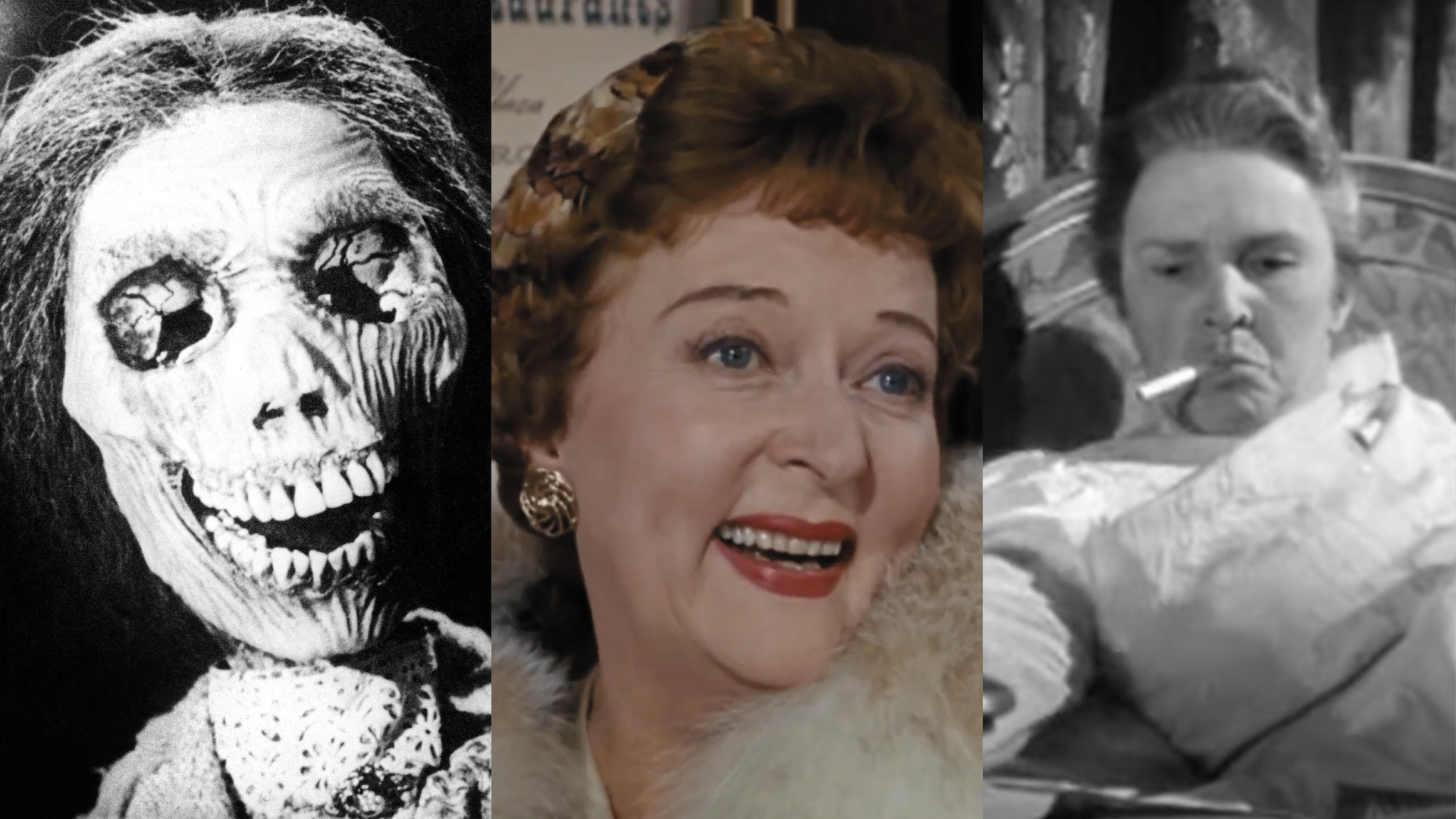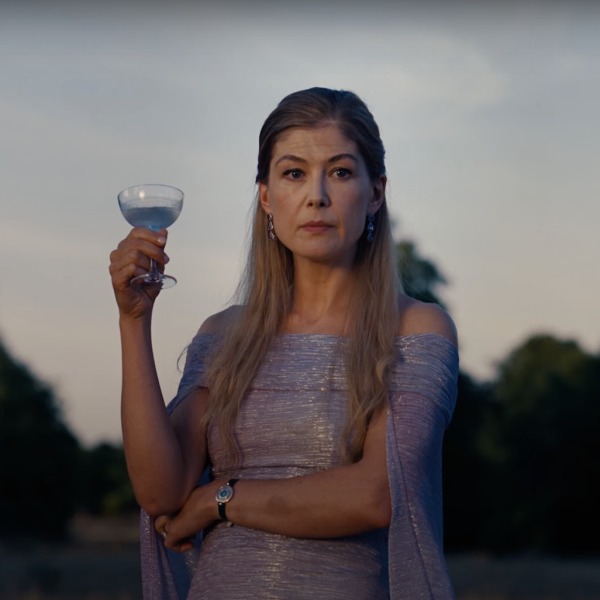There’s a story Alfred Hitchcock always liked to tell about how, when he was five years old, his father dropped him off at the local police station near his home in East London. William Hitchcock left a note for the coppers explaining that his son had been misbehaving. A policeman locked young Alfred in a cell for a few minutes and explained, “This is what we do to naughty boys.”
When Hitchcock recounted that story to Dick Cavett he was in his 70s, but the incident continued to leave a profound mark on the director. He said he was still “terrified of the police” because of that and drew a connection from that to the feelings of guilt and wrong-men-on-the-run paranoia that seeps into so many of his films.
The funny thing is, though, father characters are almost entirely absent from Hitchcock’s work. There are a few: Cedric Hardwicke’s stuffy ex-general in “Suspicion,” Henry Travers’ meek, bumbling “true crime” enthusiast in “Shadow of a Doubt,” Hardwicke again as the father of the poor murdered boy in “Rope,” the allegedly tyrannical father who Robert Walker wants to kill in “Strangers on a Train,” and Jimmy Stewart looking to rescue his kidnapped son in “The Man Who Knew Too Much.” All of these are sympathetic! And somewhat forgettable. A surprise considering the impact of his own father’s formatively scarring discipline in his life. Otherwise, father figures are as absent from Hitchcock’s work as mothers in the Disney canon.
Instead, it’s Hitchcock’s mother characters who exert a powerful emotional and psychological hold throughout his entire filmography. And are incredibly dynamic, memorable characters, ranging from mocking comic relief to true terrors, and, even, famously, a long-dead corpse. By any standard, these mother characters are far more compelling — infinitely more richly drawn — than any of their paternal counterparts. (Crucially, this article will not consider non-mother older female characters such as Mrs. Danvers in “Rebecca,” the “something of the something” society lady in “Rope,” or any of the other wealthy dowagers in Hitchcock’s work.)
There’s future “Bewitched” star Marion Lorne as Robert Walker’s mother in “Strangers on a Train.” She’s introduced giving him a manicure, before they walk over to admire her latest painting, of which Bruno cacklingly declares “That’s father!” And it’s a Dorian Gray-like portrait of someone truly monstrous-looking. “Is it? Oh,” she replies, befuddled. “I was trying to paint St. Francis.” She’s so clueless that when Ruth Roman later visits her to explain that her son is psychotic and a murderer, she brushes it off, then says, in parting, “Come see us again sometime.”
She’s of a piece with Jessie Royce Landis, only eight years older than Cary Grant, but mother to Grant’s Roger Thornhill in “North by Northwest.” As in, she’s also someone who’s completely uncomprehending of what her son’s got up to. Any true Hitchcock fan can recite verbatim her public diss of her fiftysomething child by saying to his kidnappers “You gentlemen aren’t really trying to kill my son, are you?” Yes, they really are! But even better, after humiliating her son there in a crowded elevator, is her “Roger, will you be home for dinner?” Or her response when she and her son have snuck into the room at the Plaza Hotel where the man Roger’s been mistaken for is supposedly staying, and Roger announces that this guy must have dandruff: “In that case, I think we should be leaving.”
Doris Day, by contrast, plays a positively heroic mother in “The Man Who Know Too Much,” as her loudly belted rendition of “Que Sera Sera” is what ultimately rescues her pre-teen child from his kidnappers. And indeed there is a whole strain of mother characters in Hitchcock who, unlike Lorne and Landis, are instrumental in driving the plot of their movies. Patricia Collinge plays the matriarch in “Shadow of a Doubt,” and it’s her intense devotion to her brother Charlie (Joseph Cotton) that results in him deciding to hide out in her home for a while. She thinks the world of him, idolizes him. He’s really a serial killer. When, after her daughter pieces together his crimes, and Charlie announces he’s leaving, she breaks down in one of the more touching moments in the entire Hitchcock canon. She’s no more clueless than all of us — all of us have difficulty recognizing certain harsh realities.
Several of the mothers who help drive the plot of Hitchcock’s movies are stern at best, if not outright villains. What is poor Tippi Hedren’s arc in “The Birds” if not proceeding from liberated sophisticate to emotionally stripped bare PTSD sufferer just so that she can be rendered helpless enough that Jessica Tandy’s mother character can feel like Tippi is not a threat to her son. Now Tippi is someone she can mother too. (The positive, if far more tragic, flipside of this arc is Barbara Bel Geddes in “Vertigo” heartbreakingly saying to her onetime crush Jimmy Stewart that “mother’s here” to take care of him when he’s in his own PTSD stupor following that mission belltower incident. But as we know from America Ferrara’s “Barbie” monologue, the admission of “mother’s here” closes the door definitively on any chance of a romantic connection between them.)
There’s an even far more toxic dynamic between Tippi Hedren and her mother Louise Latham in “Marnie,” the most devastating mother-child relationship in any of the Hitchcock films (even more than Norman Bates literally adopting his mother’s personality). She’s refused to discuss the traumatic event central to the childhood of Tippi’s Marnie for Marnie’s entire life. Marnie killed a sailor who was one of her then-sex worker mother’s johns when the john (Bruce Dern!) got violent. Ever since she goes into a stupor when she sees the color red — from the blood! — and hates all men. But worse, her mother has waged a decades-long campaign to undermine her daughter’s self worth, perhaps because of the legal tumult that the killing brought into their lives, or because momma got a bad leg in the encounter. “Marnie, you’re achin’ meh leg,” she says when Marnie rests her head on her lap.

She instills wildly puritanical notions in her daughter’s head: “We don’t talk smart about thuh Bible in this house, missy.” And she even takes joy in setting up a rivalry between 30-something Marnie and the preteen next-door neighbor, Jessie. Perhaps Mrs. Bates was as fearsomely sex-averse and demeaning to her son Norman in “Psycho,” but there’s always the possibility that that was just Norman’s twisted perception of his mother, not how she actually was. The ultimate mother is the one completely imagined and projected onto a hollowed out corpse. Sometimes the idea of a person is more powerful than the person themselves. But in “Marnie,” we know this is how it actually was.
For an actual example of a mother truly pulling the strings behind her son in the way Norman imagines his mother did, you have to turn to “Notorious.” This particular characterization synthesizes all the other types of mothers mentioned here into the singular Madame Sebastian, the Nazi mother of Nazi industrialist Alex Sebastian (Claude Rains). She’s never given a first name, and oddly enough the actress who plays her, Leopoldine Konstantin, doesn’t have her own first name listed in the credits either. She is just credited as Madame Konstantin.
Like Norman and his mother, Alex and Madame Sebastian live together and vie a bit for control of their mansion. An incredible moment occurs when Alex wants to finally possess the keys to the house, and he has to ask his mother for them. He goes to her room and we hear their muffled, muted voices behind a closed door, as she clearly puts up a bit of a struggle and they get sharp with each other. They’re living in Rio as German exiles after the end of World War II. Prominent supporters of the now-fallen Third Reich, they have a circle of fellow Nazis they belong to who are plotting to gather enough uranium to build their own atomic bomb. If they make a misstep at all, mother and son might well be killed by their own associates. And indeed, Alex has made a misstep: Lured by beauty, he’s married an American agent — Ingrid Bergman. If their “friends” ever find out about this, they’re dead. Madame Sebastian clearly did not want her son to marry — lump her in with the aforementioned sex averse moms — and there’s some light mocking of her son from her when he comes hat in hand and breaks the news to her about who he’s really married to.
She hoists herself up in bed — a son always has to wake his mom from a sound sleep when there’s simply no one else to turn to for help — grabs a cigarette and lights it like a badass, then goes on to say “We are protected by the enormity of your stupidity… for a time.” As in, not even their Nazi compatriots would hold Alex in such low regard as to think he would carelessly marry an American spy. Then she plays on his own feelings of guilt, when he says he wishes he could go and kill his wife right now: “Quiet, Alex. You’re almost as impetuous as before your wedding. You barred me from that episode. Let me arrange this one.” So mother and son plot to slowly poison his wife. This is appalling behavior. But on the other hand, at least it shows that this mother will always have her son’s back? Whether this is actually good parenting, we’ll leave to you to decide. (By the way, Claude Rains was 56 when he made “Notorious.” Madame Konstantin was 59.)
These characters are unforgettable. They are forces of nature, in so many ways driving these movies. With the few father characters in Hitchcock you get, say, Leo G. Carroll as Ruth Roman’s dad in “Strangers on a Train” merely looking annoyed a character went to Delaware Tech and not Harvard. The funny thing is, we know very little about Hitchcock’s actual mother, Emma Jane (née Whelan). He did tell Dick Cavett that she traumatized him at the age of three by simply saying “Boo!” to him. We know they lived near each other in the early part of his filmmaking career in England. But Hitchcock failed to convince her to move with him to the U.S. once World War II started. We know others in his immediate circle deeply shaped characters in his movies — look at how many women with glasses appear in his work as a tribute to his wife and producing partner Alma Reville — so his mother must have as well.
After all, Norman Bates said “A boy’s best friend his mother.” Hitchcock showed a director’s best asset can be unforgettable mother characters.




